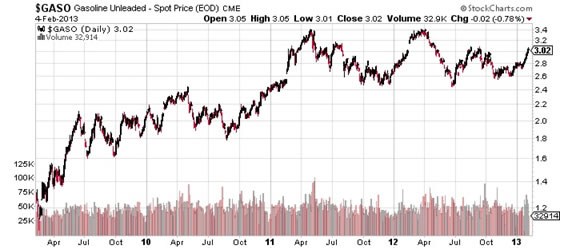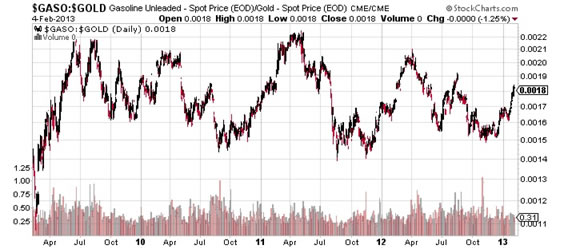U.S. Gas Prices Up 1.5 Times in Four Years; Government Still Says No Inflation?
Commodities / Gas - Petrol Feb 08, 2013 - 11:04 AM GMT Michael Lombardi writes: According to the Bureau of Labor Statistics, inflation in the U.S. economy was 1.7% in 2012. As I have written in these pages, the way the official inflation rate is calculated is obsolete. Real inflation is running much higher than 1.7%.
Michael Lombardi writes: According to the Bureau of Labor Statistics, inflation in the U.S. economy was 1.7% in 2012. As I have written in these pages, the way the official inflation rate is calculated is obsolete. Real inflation is running much higher than 1.7%.
Oil Price Information Service reports that, in 2012, $479 billion in gasoline was purchased by consumers in the U.S. economy. If you compare this number to 10 years ago, Americans are spending two and a half times more on gasoline. (Source: CNN Money, February 4, 2013) than they did in 2002. But consumer spending on gasoline didn’t go up because of increased demand; it went up because oil prices went up.
According to the Energy Department, Americans are now spending four percent of their income to buy gasoline, but they are actually buying lower quantities of it than they used to.
Look at the price of gasoline in this chart:

Chart courtesy of www.StockCharts.com
In early 2009, gasoline was trading below $1.20 a gallon. Now it trades above $3.00—an increase of more than 150% over four years.
Now, if you compare gasoline prices with gold (how many gallons of gas you can buy with an ounce of gold), which I believe gives a better picture of real inflation, gasoline prices have increased around 60% in four years.

Chart courtesy of www.StockCharts.com
Dear reader, inflation in the U.S. economy is a major concern. Sure, the government is telling us inflation is only 1.7%, but my simple example of gasoline prices questions the “official” rate. I’m sure you’re feeling the effects of higher prices as well. Look how much it cost to go out for a decent dinner, or how much food prices have gone up over the past four years. The stock market; it’s risen over the past four years, not declined. Now housing prices are inching higher, too.
Don’t tell me the government can borrow $6.0 trillion in new money over four years and the Federal Reserve can increase its balance sheet by $3.0 trillion and inflation won’t be a problem. It’s simple. The more money the Fed prints, the more U.S. dollars there are in circulation. Economics 101 tells us that too much supply pushes prices down. Hence, the U.S. dollar declines in value, so it takes more real dollars to buy goods and services.
The consumer in the U.S. economy will be the one on the hook to pay for higher prices of goods and services as businesses try to pass on higher costs to their customers. The bigger picture: higher inflation leads to higher interest rates, leading to lower disposable income, leading to no savings for Americans, leading to lower consumer demand. No wonder U.S. GDP is contracting!
Michael’s Personal Notes:
These days it seems central banks in the global economy just don’t want their currencies to rise in value. In fact, they are in a race to devalue their currencies in the false hope that a cheaper currency will make their goods and services cheaper, thus increasing demand for their goods in the global economy.
In 2009, when the Federal Reserve first began implementing quantitative easing, there weren’t a lot of other central banks doing the same thing. Now the number of central banks working to print month to devalue their currencies has increased, as when the U.S. dollar decreases in value, the value of U.S. dollar reserves at about 60% of other world central banks gold is affected.
But aside from major central banks running their printing presses overtime, the central banks of emerging markets’ economies and other smaller nations are getting into the game, too!
Take the central bank of New Zealand, for example; it sold 66 million worth of New Zealand Dollars in November of 2012, and another 200 million in December to keep its currency from rising in value. (Source: Wall Street Journal, January 30, 2013.)
On the other side of the world, central banks in Latin America are in an outright currency war. Stronger currencies are causing their exports to decline. So, central banks from Peru, Colombia, Costa Rica, and Brazil are making sure their currency doesn’t rise in value by intervening and printing more paper currency or by decreasing their interest rates. (Source: Buenos Aires Herald, January 31, 2013.)
Mexico, which has long held a hands-off approach to the currency market, is considering interest rate cuts because of the rising value of the peso and concerns regarding economic growth.
The above are only a few of the central banks making headlines with their activities. Other central banks might do off market operations to keep their currencies from rising, which we will never hear about. But what holds true is that the list of central banks in the global economy printing money is increasing. If you add central banks from Switzerland, United Kingdom, Japan, Hong Kong, Russia, and South Korea to the banks just mentioned, the fate of world fiat currencies looks bleak.
On the other side of the equation, I see gold bullion as the greatest opportunity to offset the paper money printing of world central banks. As the fiat currencies go down in value, gold bullion will rise in value. Central banks are certainly able to turn up their printing presses to print paper money, but they can’t just create more gold, as there is only a limited amount of it.
I will turn bearish on the yellow metal when I see central banks turning off their printing presses; and I don’t expect that to happen for quite a long time. Therefore, I am as bullish as ever on gold bullion.
Where the Market Stands; Where It’s Headed:
Markets have been set up for a big fall. Why? The bear market has done a masterful job in convincing investors the economy is doing better; stocks are a safe place to be again. The reality is the opposite. The market is close to topping out.
What He Said:
“As investors, we need to take a serious look at our investment portfolios and ask, ‘How will my investments be affected by an American grown recession?’ You should take what precautionary steps you can right now to protect yourself from a recession in 2007. Maybe you need to cut your own spending or maybe you need to sell some stocks that will take a beating during a recession. You know what tidying up you need to do. Don’t procrastinate…get to it now. And please remember: recessions can happen quickly, stock markets don’t go up during recessions, and the longer the boom before the recession, the longer the recession. Just based on my last point, we have plenty to worry about in 2007.” Michael Lombardi in Profit Confidential, November 13, 2006. Michael was one of the first to predict a U.S. recession, long before Wall Street analysts and economists even thought it a possibility. Michael Lombardi, MBA for Profit Confidential
http://www.profitconfidential.com
We publish Profit Confidential daily for our Lombardi Financial customers because we believe many of those reporting today’s financial news simply don’t know what they are telling you! Reporters are trained to tell you the news—not what it can mean for you! What you read in the popular news services, be it the daily newspapers, on the internet or TV, is the news from a “reporter’s opinion.” And there’s the big difference.
With Profit Confidential you are receiving the news with the opinions, commentaries and interpretations of seasoned financial analysts and economists. We analyze the actions of the stock market, precious metals, interest rates, real estate and other investments so we can tell you what we believe today’s financial news will mean for you tomorrow!
© 2013 Copyright Profit Confidential - All Rights Reserved
Disclaimer: The above is a matter of opinion provided for general information purposes only and is not intended as investment advice. Information and analysis above are derived from sources and utilising methods believed to be reliable, but we cannot accept responsibility for any losses you may incur as a result of this analysis. Individuals should consult with their personal financial advisors.
© 2005-2022 http://www.MarketOracle.co.uk - The Market Oracle is a FREE Daily Financial Markets Analysis & Forecasting online publication.



